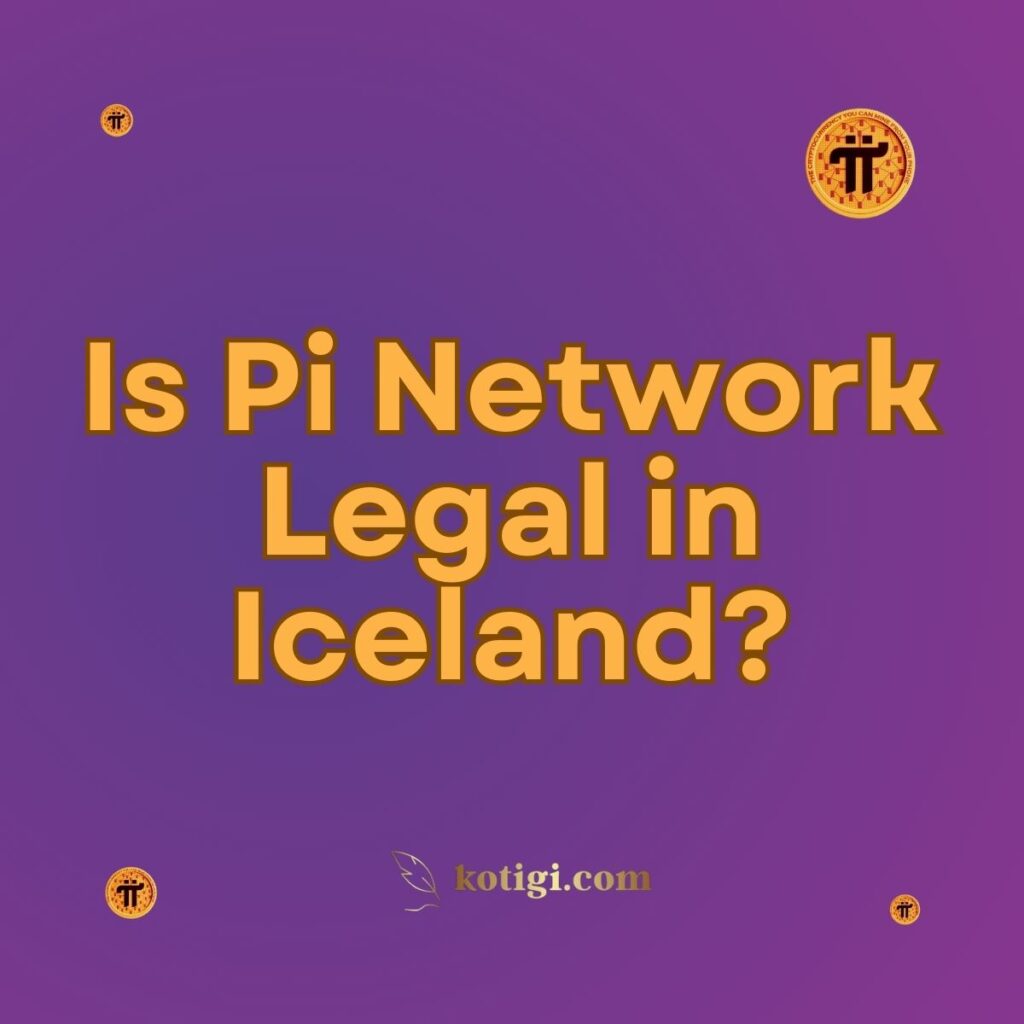
Is Pi Network Legal in Iceland?
Pi Network is not currently regulated by specific cryptocurrency laws in Iceland. While the country has not issued a clear stance on mobile-based digital currencies like Pi, it follows general EU regulations for digital assets, and users can participate in Pi Network without legal barriers for now.
Introduction
The rise of mobile-based cryptocurrency platforms like Pi Network has sparked interest among users worldwide, including in Iceland. However, with no specific legislation addressing Pi Network’s legal status, Iceland’s regulatory framework remains uncertain. Like many European countries, Iceland follows EU guidelines on cryptocurrency regulations, providing a level of oversight but not explicitly targeting emerging platforms like Pi. In this post, we will explore whether Pi Network is legal in Iceland, assess potential risks, and examine what users in Iceland should consider when participating in the platform.
1. Iceland’s Cryptocurrency Legal Framework
Iceland’s approach to cryptocurrency is shaped largely by EU regulations and general financial oversight. While the country does not have a dedicated legal framework for cryptocurrencies like Pi Network, it does regulate digital currencies through broader financial laws.
1.1 EU’s Influence on Iceland’s Regulations
As part of the European Economic Area (EEA), Iceland aligns its financial and regulatory policies with those of the European Union. While Pi Network is not directly addressed, Icelandic users benefit from the EU’s digital currency guidelines, which help protect consumers and ensure transparency.
1.2 Central Bank of Iceland’s Position
The Central Bank of Iceland has not issued any statements specifically concerning Pi Network. However, like other central banks across Europe, it has issued warnings about the risks of engaging with cryptocurrencies, highlighting volatility and the lack of consumer protections.
1.3 Iceland’s Conservative Financial Policies
Iceland is known for its conservative financial policies, especially in the wake of its 2008 banking crisis. While the government has not banned cryptocurrency use, it exercises caution in allowing new digital financial products to integrate into its economy.
2. Is Pi Network Legal in Iceland?
Since Pi Network is not subject to specific cryptocurrency regulations in Iceland, it operates in a legal gray area. Users can mine and engage with Pi, but they should be aware of the risks associated with unregulated digital currencies.
2.1 No Official Ban or Endorsement
There is no official ban on using Pi Network in Iceland, nor is there any government endorsement of the platform. This leaves users free to participate in Pi Network activities, albeit without legal protections.
2.2 General Cryptocurrency Guidelines Apply
In the absence of Pi-specific legislation, Icelandic users must follow general cryptocurrency guidelines. This means adhering to exist financial laws, especially those related to tax obligations and anti-money laundering practices.
3. Financial Regulations Affecting Pi Network Users
While Iceland does not regulate Pi Network directly, participants must consider the country’s broader financial and tax regulations, particularly concerning digital currencies.
3.1 Anti-Money Laundering (AML) and Counter-Terrorism Financing (CTF) Regulations
Iceland enforces strict AML and CTF regulations, which aim to prevent illicit financial activities. Although Pi Network does not currently involve monetary transactions, users may eventually need to comply with these laws as the platform evolves.
3.2 Taxation of Cryptocurrency
Cryptocurrency income is taxable in Iceland. Although Pi has not yet been integrated into traditional financial systems, users who eventually profit from Pi tokens may be subject to tax obligations.
3.3 Compliance with Financial Reporting
As Pi Network transitions into a more mainstream currency, users may be required to report their participation for tax purposes. This is particularly important as Iceland continues to refine its approach to digital currency oversight.
4. Risks for Pi Network Users in Iceland
Although Pi Network is not explicitly banned in Iceland, there are still risks associated with participating in an unregulated cryptocurrency platform.
4.1 Lack of Legal Protection
Users of Pi Network in Iceland do not have the same level of protection as those engaging with government-regulated financial services. If issues arise with the platform, users may find themselves without legal recourse.
4.2 Regulatory Uncertainty
The absence of specific regulations for Pi Network means that Icelandic authorities could introduce new rules or restrictions at any time. Users should stay informed about potential changes to avoid legal complications.
4.3 Potential Tax Liabilities
As Pi Network evolves, users in Iceland could face tax liabilities if they exchange Pi for other currencies or generate income from their Pi holdings. Failing to comply with tax regulations could result in penalties.
5. Opportunities for Pi Network in Iceland
Despite the risks, Pi Network’s unique mobile mining approach offers opportunities for users in Iceland, particularly as cryptocurrency adoption grows globally.
5.1 Aligning with EU Regulations
Pi Network’s potential to align with EU cryptocurrency guidelines may help it gain acceptance in Iceland. As the platform grows, it could offer Icelandic users more secure and regulated ways to participate in the digital economy.
5.2 Financial Inclusion
Pi Network’s mobile-first model could provide greater financial inclusion for Iceland’s population, particularly for those who may be excluded from traditional banking services. This aligns with global trends toward decentralization and digital empowerment.
5.3 Potential for Future Regulation
As cryptocurrency adoption increases, Iceland may eventually introduce clearer regulations for digital currencies, including Pi Network. This could provide a more stable environment for users to participate without fear of sudden regulatory changes.
Conclusion
In conclusion, Pi Network operates in a legal gray area in Iceland, with no explicit laws regulating or banning its use. While Iceland follows broader EU guidelines on digital currencies, Pi Network users are not currently subject to specific regulations. However, the regulatory landscape could change, and users should remain informed about potential tax and financial reporting obligations. As Pi Network continues to grow, it may offer Icelandic users opportunities for financial inclusion and participation in the evolving digital economy.
Key Takeaways
- Pi Network is not explicitly regulated in Iceland, operating in a legal gray area.
- Iceland follows EU cryptocurrency guidelines, which indirectly affect Pi Network users.
- There is no official ban or endorsement of Pi Network in Iceland.
- Users must comply with general financial laws, such as AML and tax regulations.
- Pi Network could provide financial inclusion opportunities, but users should remain cautious of potential regulatory changes in the future.




